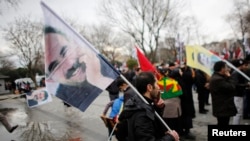Clashes between the outlawed Kurdish Workers' Party (PKK) and Turkey's military that left at least five dead in recent days are casting doubt on the chances of a long-running peace process advancing before parliamentary elections in June.
Some observers argue the clashes are part of an electoral strategy by President Recep Tayyip Erdogan to appeal to Turkish nationalist sentiment to boost the ruling party’s share of the vote. Government officials accuse Kurdish hardliners opposed to a settlement of the three-decade insurgency of purposelessly sabotaging the peace process by provoking the army.
Army officials said in a statement the clashes in Agrı province erupted after PKK fighters fired on security forces. The PKK says it did not attack first.
The fighting coincided with the first major debate in the country’s June 7 parliamentary election campaign.
Prime Minister Ahmet Davutoglu told party workers on Sunday “the attacks targeted Turkish democracy and the election poll.”
President Erdogan said, “A separatist terror organization, which aims to dynamite the peace in our country and sabotage the solution process, attacked our security forces who serve to ensure the security of our nation.”
The legal, mainly Kurdish left-wing People's Democratic Party (HDP) argued the fighting was “pre-planned” and orchestrated by the government.
At an election rally in Istanbul, Peoples’ Democratic Party co-chair Selahattin Demirtas accused the army General Staff of working for the ruling Islamist Justice and Development Party (AKP).” He said, "The army is the country’s army, not one party’s. The General Staff is not a party running in the elections."
The April 11 Agrı clashes continued for 12 hours. The last time the military and the PKK fought on a serious scale was last October when Turkish warplanes launched airstrikes on the PKK in southeast Turkey, striking targets in five different locations in the town of Daglica — near Turkey’s borders with Iran and Iraq. Turkish media said the airstrikes came after Kurdish separatists attacked a military barracks nearby.
That accusation was denied by the PKK, which maintained the air raids were punishment for days of Kurdish street protests against the Turkish government in more than a dozen towns because of Ankara’s refusal to intervene militarily to defend the Syrian border town of Kobani from Islamic militants.
The struggling peace process has seen considerable ups and downs in recent weeks. There have been high hopes of a breakthrough, especially when in March the imprisoned PKK leader Abdullah Ocalan, who has been conducting negotiations with the government from his jail cell, made official the de facto cease-fire announced three years ago.
Ocalan called on the outlawed group to convene an extraordinary congress to “end the 40-year-long armed struggle” against Turkey. In a letter read during the Kurds’ Nevruz celebrations in southeastern Turkey on March 21, he also emphasized the need for a “democratic solution” to Turkey’s Kurdish problem, with greater political and language rights granted to the Kurds.
It isn’t known whether the PKK has held such a congress, which would take place in secret.
Just days before Ocalan’s letter, President Erdogan dismissed the idea there is a Kurdish problem.
Speaking in Balıkesir province, President Erdogan argued Kurds already enjoy equal rights with the rest of the country and shouldn’t need anything else. “The only thing in their eyes is the Kurdish question. What are you talking about? There is no such thing; there is no Kurdish question,” he thundered.
His comments earned fierce criticism from opposition politicians and also from his own government ministers.
Despite Erdogan’s dismissal of Kurdish demands, PKK military leader Cemil Bayık told German TV last week the group is tired of fighting and it now accepts there will be no independent, separate Kurdish state carved from Turkish territory.
“We will try a political solution. We do not want to fight against Turkey any more. We say that’s enough. Neither us nor the Turkish state has achieved our goals through war,” he said.
“To hear those words from one of the most hawkish PKK leaders is a strong signal that the bloody three-decade-long fight really could be coming to an end,” said columnist Murat Yetkin, who writes for the daily Hurriyet newspaper.
The Kurdish insurgency was launched in 1984 and more than 40,000 people have been killed.
Some analysts argue Erdogan’s tough-sounding remarks about the Kurdish peace process, as well as the military clashes, are part of a complicated electoral maneuver by the Turkish president before the June 7 elections.
In order to win a commanding parliament majority, his Justice and Development Party needs the legal People's Democratic Party to do well and cut into the votes of major AKP rivals. The military clashes could help the Peoples’ Democratic Party do just that, while at the same time boosting nationalist Turkish sentiment and increasing the AKP share of the vote.




